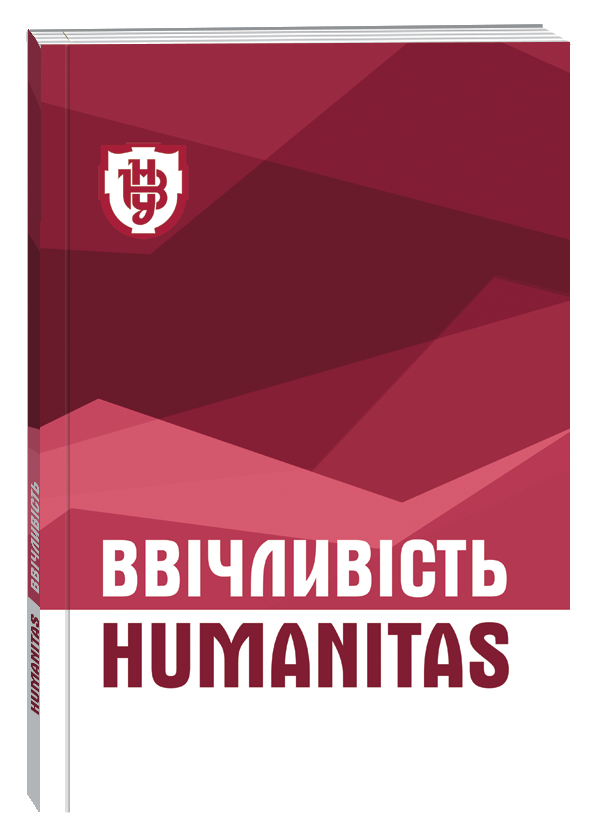FOREIGN EXPERIENCE OF FORMING INCLUSIVE SOCIETY: LESSONS FOR UKRAINE
DOI:
https://doi.org/10.32782/humanitas/2024.3.19Keywords:
inclusiveness, social inclusion, inclusive mobility, inclusive governance, inclusive infrastructure, inclusive economy, inclusive education, inclusive cultureAbstract
The article substantiates the importance and necessity of developing and implementing in modern conditions the concept of forming inclusive society, which is caused not only by the increase in the number of people with disabilities, but also by the desire of the international community to provide them with decent living conditions and self-realization through the creation of optimally favorable conditions for social inclusion in the system of public relations. The authors analyzed the historical context of the formation of the concept of inclusiveness of society from the idea of architectural accessibility and barrier-free space to its modern interpretation in the context of inclusive governance, inclusive infrastructure (architectural accessibility of buildings, barrier-free space and universality of design), inclusive economy, inclusive education, inclusive medicine and inclusive culture. The article reveals the conceptual approaches of foreign countries to the formation of social inclusiveness of society and ways of its implementation. The property of Ukraine regarding the formation of inclusiveness of society and the expediency and necessity of creative use of progressive ideas of foreign experience are characterized. The purpose of the article is to analyze the foreign experience of forming inclusive society with the aim of borrowing progressive ideas for implementation in Ukraine. Theoretical methods were applied in the research process: study, analysis, synthesis, comparison, summarization of information on Ukrainian and foreign websites, as well as research of publications in the Google Scholar electronic database. A theoretical and methodological analysis of the content of scientific definitions was carried out: social inclusion, inclusiveness, inclusive infrastructure, conceptual foundations of building inclusiveness of society and methods of their implementation.
References
Безбар’єрність: Безбар’єрний простір в Україні: новація, яка покликана забезпечити рівні права для всіх українців. URL: http://psjust.gov.ua/post_news/%D0%B1%D0%B5 (07.02.2024).
Бізнес без бар’єрів. URL: https://business.diia.gov.ua/business-without-barriers (07.02.2024).
ДБН В.2.2-40:2018. Державні Будівельні норми України. Будинки і споруди «Інклюзивність будівель і споруд». Київ: Міністерство регіонального розвитку, будівництва та житлово-комунального господарства України, 2018. 64 с.
Дія. Цифрова освіта. URL: https://osvita.diia.gov.ua/courses/barrier-free-literacy (07.02.2024).
Довідник безбар’єрності – без бар’єріів. URL: https://bf.in.ua (07.02.2024).
Закон про рівні можливості для людей з обмеженими можливостями: Закон ОАЕ Concerning the Rights of Persons with Disabilities in the Emirate of Dubaі від 2.03.2022 URL : https://dlp.dubai.gov.ae/Legislation%20Reference/2022/Law%20No.%20(3)%20of%202022.html (дата звернення: 02.03.2024).
Замки Тернопільщини. URL: https://pocketbook.ua/zamki-ternopil-schini pocketbook.ua/zamki-ternopil-schini (07.02.2024).
Збаразький замок для людей з вадами зору URL: https://rubryka.com/2021/11/11/zbarazkyj-zamok-naternopilshhyni-oblashtovuyut-dlya-lyudej-z-invalidnistyu/ (07.02.2024).
Кузава І. Б. Порівняльна характеристика термінів «інклюзія» та «інтеграція». Науковий часопис Національного педагогічного університету імені М. П. Драгоманова. 2012. № 9. С. 149–153.
Мохнюк Р. С. Інклюзія як один з напрямів стратегії розвитку громадянського суспільства: чинник культуротворчості. Питання культурології. 2022. № 39. С. 182–193. URL: http://issues-culture-knukim.pp.ua/article/view/256926 (дата звернення: 07.03.2024).
Найда Ю. М., Ткаченко Л. М. Стандарти громадсько-активної школи: соціальна інклюзія: навчально-методичний посібник / під заг. ред. Даниленко Л. І. Київ: ТОВ «Видавничий дім «Плеяди», 2014. 68 с.
Порошенко М. А. Інклюзивна освіта. Київ. Україна, 2019. 300 с.
Семерун Ю. А. Безбар’єрне міське середовище: ситуація в Україні та закордонний досвід. Містобудування та територіальне планування. 2013. Вип. 49. С. 484–492.
Стрельнікова О. О., Єсеніна Н. О. Поняття та сутність соціальної інклюзії у соціальній роботі. Сучасне суспільство: політичні науки, соціологічні науки, культурологічні науки: зб. наук. пр. Харків, 2019. Вип. 1 (17). С. 233–241.
У Держстаті розповіли, скільки в Україні людей з інвалідністю. URL: https://www.radiosvobodaorg.cdn.ampproject.org/v/s/www.radiosvoboda.org/amp/news-ukraina-invalidnist-statystyka (07.02.2024).
Шиць О. Р. Сучасні тенденції забезпечення соціальної інклюзії в розумних містах: Тези доповідей ІІ Міжнародної науково-практичної конференції (Люксембург, 26-28 січня 2021 р.). Люксембург 2021. С. 224−226 с.
Behindertengleichstellungsgesetz, 2016 URL : https://www.bmas.de/DE/Service/Gesetze-und-Gesetzesvorhaben/gesetz-zur-gleichstellung-behinderter-menschen.html#:~:text=Ziel%20der%20Reform%20des%20Gesetzes,zu%20gew%C3%A4hrleisten%20und%20ihnen%20eine (дата звернення: 07.03.2024).
Digital Agenda Viennа. URL: https://smartcity.wien.gv.at/site/en/digital-agendavienna (07.02.2024).
Smart City Wien Framework Strategy 2019-2050 – Vienna’s Strategy for Sustainable Development. URL: https://www.wien.gv.at/stadtentwicklung/studien/pdf/b008552.pdf (07.02.2024).
Tablet For Seniors. URL: https://smartcity.wien.gv.at/site/en/seniortab-2/ (07.02.2024).







